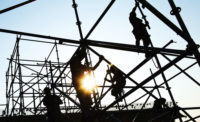As temperatures heat up across the country and landscaping work kicks into high gear, several industry associations are partnering with OSHA to help protect their workers from heat-related illnesses and landscaping injuries.
The Southeast Safety Stand-Down will take place April 17-18 from 7 a.m. to 8 a.m. EDT. The Associated General Contractors of Georgia Inc., OSHA, employers, and their workers in Alabama, Florida, Georgia, and Mississippi are organizing the effort.
At the safety stand-down events, employers will stop work voluntarily, and conduct safety training with employees on landscaping hazards, such as falls, being crushed or hit by objects, electrical, and heat exposure.
Heat takes some getting used to
When the heat index is high, special precautions are needed to protect un-acclimatized workers while they adjust, particularly on the first few days of the job. Some health conditions can put workers at greater risk of heat-related illness. These include diabetes, kidney and heart problems, pregnancy, and being overweight.
OSHA recommends that employers develop a heat acclimatization program that has work proceeding at a steady, moderate rate that can be sustained in the heat and increasing the workload incrementally by up to 20 percent on each subsequent day. A sudden spike in heat can be dangerous for even workers who are acclimatized to hot weather. Under those conditions, workers should begin with 50% of the normal workload and time spent in the hot environment, 60% on the second day, 80% on day three, and 100% on the fourth day. Full acclimatization may take up to 14 days or longer.
People who have not worked in hot weather for a week or more need time for their bodies to adjust. They need to take more breaks and not do too much strenuous work during their first weeks back on the job.
Other hazards
In addition to heat, landscape workers face hazards from using machinery, equipment and materials that can cause cuts and amputations, electrical injuries, and exposure to noise and pesticides. They are at risk for musculoskeletal injuries from lifting heavy objects and slips trips and falls.
“Employers who train their workers, and implement effective safety and health programs can reduce the risks of workers being injured on the job,” said Kurt Petermeyer, OSHA Regional Administrator. “Educational events such as these are valuable tools in helping to assure a safe workplace for everyone.”
More information
Contact your local OSHA area office for event information.
For more information on how to identify and correct landscaping hazards, visit OSHA’s Landscaping and Horticultural Services page.









